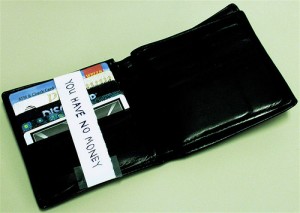
As parents, it is our job to teach our kids about a lot of things: driving, reading, manners, sex, ethics, and much, much more. How many of us spend the time and effort to teach our kids about money? A basic financial education would make money in early(and even late) adulthood easier to deal with. Unfortunately, money is considered taboo, even among the people we are closest to.
It’s time to shatter the taboo, at least at home. Our kids need a financial education at least as much as they need a sex education, and—properly done—both educations take place at home.
How do you know what to teach? One method is to look back at all of the things you’ve struggled with and make sure your kids know more than you did. If that won’t work, you can use this list.
- Balance a checkbook. This is the most basic of financial skills. The easiest way to teach this is to help him open a checking account and demand he keeps the register current and reconciled. Make him use a paper register. Quicken or an alternative may handle the work, but your kid will never learn the underlying principles if he doesn’t have to sit down with a pen and calculator to do the work. The cheat can come later, when he is capable of handling the task himself. It’s the same reason schools don’t let kids use calculators until the basics are thoroughly mastered.
- Calculate paid interest. Understanding how much something costs after accounting for interest should be enough to scare anyone away from credit cards. I believe that the reason it doesn’t is because most people don’t understand how to figure out what interest is costing them. In case you don’t know yourself, the math is simple: balance X interest rate(as a decimal) / 12. That will show you how much you are paying each month for the privilege of borrowing money.
- Use your money to make money, not to pay interest. The flip side of interest is earned interest. It’s always best to let your money work for you, building your wealth than to struggle to finance a bank’s payroll liabilities.
- Save 25%. My son is required to put a quarter of everything he earns in his bank account. He gets $20 for shoveling the neighbor’s driveway, so $5 goes in the bank. The money he gets for gifts is handled the same way. Everything he gets, whether it be from a gift, his allowance, or work he does—gets divided the same way. If I can establish that habit for him, and impress upon him the value of saving 25% enough that he continues into adulthood, he will never have money problems.
- Always contribute to retirement. At every opportunity, from every paycheck, make a contribution to retirement. At a minimum, a 401k contribution should be made at a level that takes full advantage of any company match. If there is no match, even $25 per paycheck will add up over time. Teach them to work towards the 401k contribution limits.
- Spend less than you earn. This is the shining, glorious foundational principle of successful finances. Not just individuals, but businesses and even governments should learn this lesson. If–at all times–you are spending less than you earn, you will have more options to handle the remaining bits. If you live on the wrong side of this equation, you will never be able to get ahead, no matter how hard you work.
Those are the lessons that I am working to instill in my children, a little at a time. Am I missing any?









 budget” width=”300″ height=”213″ />We are almost following his
budget” width=”300″ height=”213″ />We are almost following his